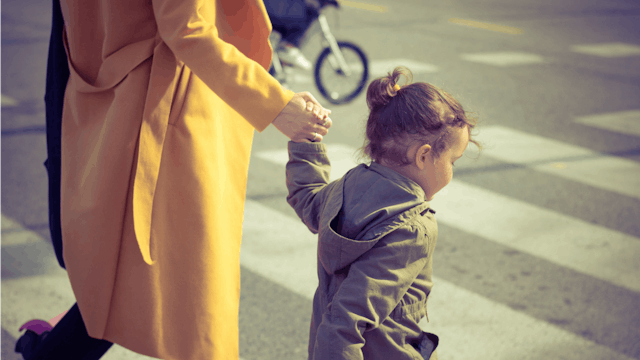How Adopting Changed The Way I Parent

“I just think people parent adopted kids differently.”
Comments like this make my insides nearly explode. I am Mama to one daughter by adoption and another daughter by birth, in that order. I may treat them differently because they are different people, different ages, or have different capabilities, but never because one is adopted and the other is not.
Are such armchair commentators imagining adoptive parents are too lenient with the children for whom we waited, and jumped through many hoops to adopt? Or maybe they wish to imply the opposite — that adoptive parents are too harsh with our children because we somehow do not love them in the same way as children whom we birthed?
It’s usually a terrible idea to stereotype an entire segment of the population who have just as much baggage and promise as we enter parenthood as everybody else. But I will give them this: becoming a parent via adoption has made me parent — both my children — differently.
Here are 4 ways that I know I parent differently because we adopted our first child:
1. I have no qualms about asking for or receiving all available resources.
We have asked for evaluations for speech therapy, physical therapy, occupational therapy, and any other kinds of therapies without hesitation. If resources are offered, we always say yes. For example, since our older daughter spent her first two years of life in a country where English is not spoken – even though we do not speak that first language at home except for a few vocabulary words– she qualifies for ELL (English Language Learner) services at her elementary school. I explain that ours is not a typical ELL situation and, if resources are needed for other kids, we can certainly step aside, but the teacher assures me she still qualifies for some extra enrichment, so sign us up.
I can see how admitting a child’s special needs might feel like a blow to the ego especially if they are born with your genes, your prenatal care, your family history. But since we entered parenthood through adoption, identifying every possible way I can help my daughter rise to her full potential is a core part of my job description. Kids who have been through trauma — which includes separation from a birth parent — need every resource we have available to us, and I’m her mother so you better believe I’m going to find it and get it for her.
2. I don’t assume I know everything about my child.
Or that I know every contributing factor to why she feels or acts a certain way. I know there’s history I am neither aware of, nor able to go back and change. There are neural pathways I cannot re-arrange. I can probably assume that with the child I birthed too. There have been incidents, personality quirks, I cannot account for, emotions I cannot get to the root of, even for the daughter I birthed.
But learning about trauma’s lasting effects and reading research or accounts by adult adoptees certainly helps me to grasp my limited understanding (and once again, ask for help) as a parent of both my children. A healthy awareness of the scope of my own ignorance pushes me to ask more questions and give myself and our kids more grace.
3. I know attachment takes work, and broken trust takes great effort to repair.
We had lots of guidelines and advice for bonding and forming attachment at the outset of our adoption. Everyone acknowledged that our child had broken bonds of trust with her birth parents even if she was too young to remember or articulate that. Well, when we birth children, there’s not automatic attachment or bonding. It grows from constantly responding to the child’s needs, and sometimes we break that too. Parents of only kids by birth do well to remember that attachment takes intentional, repeated reinforcement, and repair when we have not been reliable in our care, or unconditional with our love.
4. I have to talk about diversity in how families are formed, ethnicity, and culture.
Parents with only children by birth may not need to talk about adoption, foster care, kinship adoptions, or surrogacy. White people in the United States are not forced to talk with their kids about race or ethnicity. But we should.
We should be the ones to prepare them for all the questions raised by encountering someone whose family is different from their own, or another kid’s surprise at their own background. We have to prepare them to stand up against those who would belittle someone for any of these markers of identity. I want to be the one who gives my children’s life circumstances a healthy “spin” so the negativity they could hear will not ring true. When they are adults, it should be obvious to them that there are many ways to become family, but all of them through our choices to love one another no matter what.
This article was originally published on